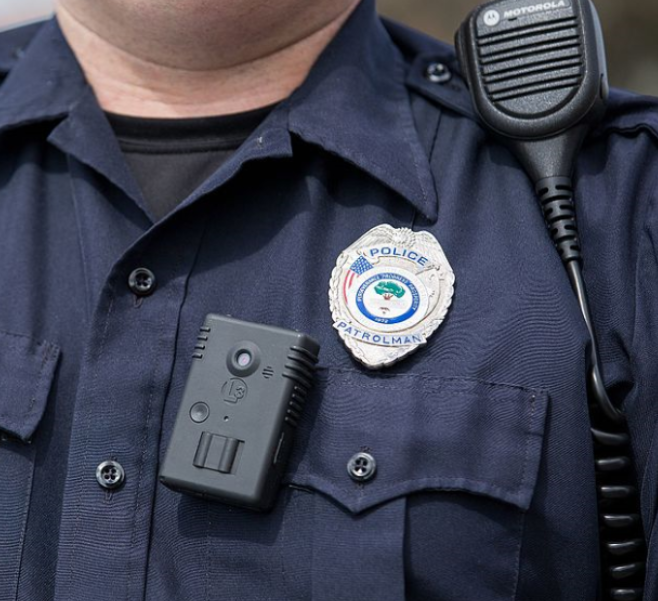A Battle Over Sheriff’s Bodycam Policy
Two supervisors push for faster public release of video evidence, but committee says no.

Police body camera. Photo by Ryan Johnson, (CC BY-SA 2.0), via Wikimedia Commons
At its next meeting, the Milwaukee County Board will deliberate on a video and body camera policy for the Milwaukee County Sheriff’s Office (MCSO), though it does not have the authority to implement the policy.
The policy is modeled on one approved by the City of Milwaukee’s Fire and Police Commission (FPC) in April and temporarily suspended pending the outcome of a lawsuit filed by the Milwaukee Police Association, the union representing rank-and-file Milwaukee police officers. Under the policy, if someone is killed or injured by an officer, or in their custody, any video evidence must be released to families in 48 hours and the public in 15 days.
The resolution before the board asks the MCSO, the District Attorney’s Office, the Community Reintegration Center (CRC) and the Vel R. Phillips Juvenile Detention Center to develop a similar policy. Currently, the release of video evidence from the MCSO and other county agencies is governed by state open records law. A decision on the lawsuit over the city’s policy is expected from Judge Brittany Grayson in March.
The same activist group pushed the policy at the city and the county: The Milwaukee Alliance Against Racist and Political Repression. The resolution bringing the matter before the board was introduced by Sup. Ryan Clancy, and co-sponsored by Supervisors Juan Miguel Martinez and Caroline Gómez-Tom.
The county board’s Committee on Judiciary, Law Enforcement and General Services has considered the policy during three meetings since September. In December, a vote to recommend adoption failed at the committee. The board later voted to send it back to the judiciary committee. On Monday, a motion to recommend the policy for adoption failed to pass the committee again. It heads to the full board now without a recommendation.
As an elected constitutional officer the Milwaukee County Sheriff has the sole authority to set departmental policy. The board’s resolution would only be a suggestion for Sheriff Denita Ball. Ball’s administration has argued against the policy.
Chief Deputy Daniel Hughes told supervisors the MCSO is primarily concerned that releasing video evidence to families and the public before the completion of an investigation could “negatively impact” the investigative process. Specifically, he said it could lead to key evidence becoming public before all witnesses have been identified or interviewed, including law enforcement officers. Witnesses or suspects could tailor their statements after viewing the video evidence, he said.
“If you have bits and pieces of evidence that jump out of sequence or jump out of the hands of the investigators who are trying to conduct a thorough investigation, it becomes problematic,” Hughes said.
The MCSO is also concerned it would no longer be able to participate in the Milwaukee Area Investigative Team (MAIT), which was established to have outside law enforcement agencies investigate police shootings. The protocols for MAIT set out specific rules for the release of video evidence that could be in conflict with the proposed policy, Hughes said.
Alan Chavoya, outreach chair for the Milwaukee Alliance, told supervisors that all these same concerns were raised by Milwaukee police when the policy was pursued at the city level. He said his organization is pushing for the policy because, “This is something that is deeply felt, and something that we deserve to understand how it is that we’re being policed, because it is our democratic right to know that.”
Kerrie Hirte, the mother of Cilivea Sunray Thyrion who committed suicide at the Milwaukee County Jail in 2022, told the committee that she supports greater transparency from the MCSO and the public release of video evidence related to her daughter’s death. The district attorney’s office decided not to bring criminal charges related to Thyrion’s death.
Clancy challenged the police and sheriff’s rationale for keeping their current video release: “We’ve seen folks across the country make this same line of arguments like ‘Oh, potentially this could derail an investigation,’ and we see no evidence actually brought up that that is happened, or that it’s happened to the extent that it couldn’t be mitigated by the exceptions in this policy.”
Clancy asked Hughes for an example of a time that a video release has affected an investigation. Hughes offered the example of the shooting of Terry Williams by former MCSO Deputy Michael Truax. Though, Hughes clarified, “you could argue that it didn’t negatively, ultimately negatively, impact the investigation. The sequence of the investigation was impacted.”
In 2017, Truax shot and killed Williams on Lincoln Memorial Drive. The sheriff at the time, David Clarke, ordered video evidence released to the public within days of the shooting. Truax declined to be interviewed by investigators for “an exorbitant amount of time,” Hughes said. The Milwaukee County District Attorney ultimately did not charge Truax, a decision that arrived more than a year after the shooting. Truax is now a police officer in Minnesota.
After public comment and Hughes’ testimony, the committee voted three to two against adoption of the policy, with Supervisors Clancy and Martinez voting in favor and Supervisors Patti Logsdon, Deanna Alexander and Willie Johnson, Jr. voting against.
If you think stories like this are important, become a member of Urban Milwaukee and help support real, independent journalism. Plus you get some cool added benefits.
MKE County
-
Ron Johnson Says Free-Market Principles Could Fix Education
 Jul 17th, 2024 by Graham Kilmer
Jul 17th, 2024 by Graham Kilmer
-
RNC Will Cause Some County Services To Be Moved to Wauwatosa
 Jul 12th, 2024 by Graham Kilmer
Jul 12th, 2024 by Graham Kilmer
-
Hank Aaron State Trail Will Be Closed For RNC, State Fair
 Jul 12th, 2024 by Graham Kilmer
Jul 12th, 2024 by Graham Kilmer






















What are body cam videos? Public records. They are owned by the public. The Sheriff does not own them but holds them in trust. There are valid concerns about releasing evidence to the public. They might be shown on the news before the investigation is over. But that goes both ways. I suggest they immediately be made available to a representative of a family, such as a lawyer, and that there be some kind of minimal confidentiality requirement in the short term. Perhaps in a more serious situation provided unedited to a judge. That would satisfy both sides’ needs.